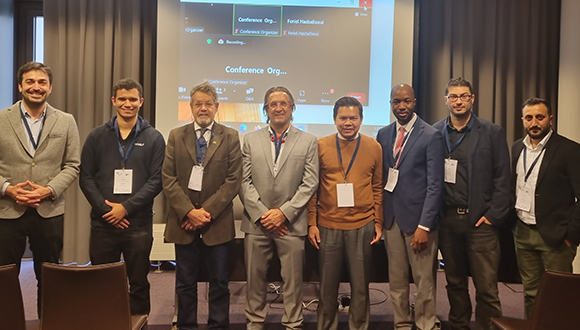Thu, 06 July, 2023
Cambridge, United Kingdom - Paul Sukpe is a structural integrity engineer with a passion for exploring the failure of engineering structures, particularly offshore. Armed with a BSc in Mechanical Engineering from the Kwame Nkrumah University of Science and Technology in Ghana, and an MSc in Mining and Power Engineering from the Wroclaw University of Science and Technology in Poland, Paul has always been committed to pursuing a career exploring structural integrity and failure analysis.
From MSc to PhD...
Wishing to pursue industry-led academia, Paul joined the MSc in Structural Integrity (Asset Reliability Management) with Brunel University London and NSIRC, and after graduating in 2020, Paul joined the NSIRC PhD programme with Brunel University and sponsorship from Lloyd's Register Foundation.
His doctorate aimed to provide enhanced levels of toughness associated with loss of crack-tip constraint that would have major advantages for safety cases involving components with defects. He was particularly interested in the transferability of experimentally measured fracture toughness data to structural piping components to predict in-service residual and remaining life.
Significant efforts have been made in recent years in fitness-for-service (FFS) and engineering critical assessment (ECA) procedures that provide a concise framework to relate crack size with applied loading, using failure assessment diagrams (FAD) to evaluate the severity of crack-like flaws. These approaches rely on using fracture toughness data measured from deeply notched specimens under bend loading to guarantee high levels of stress triaxiality, which drive the fracture process. Several defect assessment methodologies based on the FAD concept, such as R6 and BS 7910, are now well established and widely employed to analyze the significance of defects in structural integrity assessment to provide conservative acceptance criteria.
However, most structural defects, such as in offshore pipelines, are very often part-through surface cracks that generally develop low levels of crack-tip constraint associated predominantly with tensile loading. The transferability of experimentally measured fracture toughness data to structural piping components, therefore, remains essential in accurately predicting in-service residual and remaining life.
Motivated by these observations, Paul's project investigated the application capability of the FAD approach for the assessment of cracked pin-loaded single edge notched tension (SENT) and three-point single edge notched bend specimens at low temperature (-120℃). The research utilizes the structural assessment of low constraint structural components, using fracture toughness data obtained from deeply notched fracture specimens may be safe, but overly conservative, which may result in unnecessary maintenance time and costs.
 Paul (3rd from the right) alongside fellow presenters at The World Conference on Mechanical Engineering in Berlin, Germany. Photo: Paul Sukpe
Paul (3rd from the right) alongside fellow presenters at The World Conference on Mechanical Engineering in Berlin, Germany. Photo: Paul Sukpe
The transferability of fracture toughness obtained from a laboratory specimen to an actual cracked structural component becomes an important issue in structural integrity assessments based on two-parameter fracture mechanics methodology. The results of the study will help the industry with the refinement and enhancement of the current defect assessment procedure, BS 7910, which provides safe but conservative assessments and increases safety margins for the defect assessments.
Paul's research work has already been presented at The World Conference on Mechanical Engineering held in Berlin, Germany, organised by the STECONF in partnership with Scientific Research Publishing (SCIRP). Talking about his experience, Paul mentions how his studies at NSIRC enhanced his conference experience. "For me, it was a great confidence booster to have presented at an international conference thanks to my previous presentations at NSIRC. It was exciting to discuss my work in detail with diverse groups of people, mixing industry with academia, particularly the impact my research will have on my future career."
Since obtaining his doctorate, Paul has started his new position as a Postdoctoral Researcher at Imperial College London.
Industry-Focused Academia
In today's rapidly changing world, it is more important than ever that academia and industry work hand in hand. By fostering a collaborative relationship between these two spheres, we can ensure that the skills and knowledge being taught in universities and colleges are directly relevant to the needs of businesses and other organisations. This means that graduates will be better equipped to hit the ground running in their chosen careers, and that employers will have access to a pool of talent that is perfectly aligned with their requirements.
Industry-focused academia also benefits society as a whole. By encouraging innovation and entrepreneurship, academic institutions can help to drive economic growth and create new job opportunities. Additionally, research conducted in collaboration with industry can lead to breakthroughs in areas such as medicine and renewable energy, which have the potential to transform lives and mitigate some of the most pressing challenges facing our planet. By prioritising industry-focused academia, NSIRC has created a virtuous circle in which education and business feed into each other, driving progress and improving the lives of people everywhere.
Visit the Study with Us page and discover more about the course at NSIRC